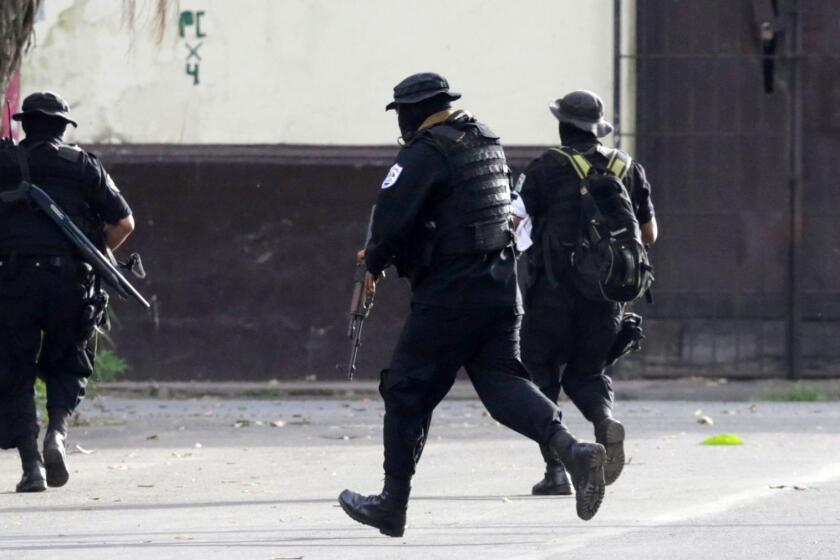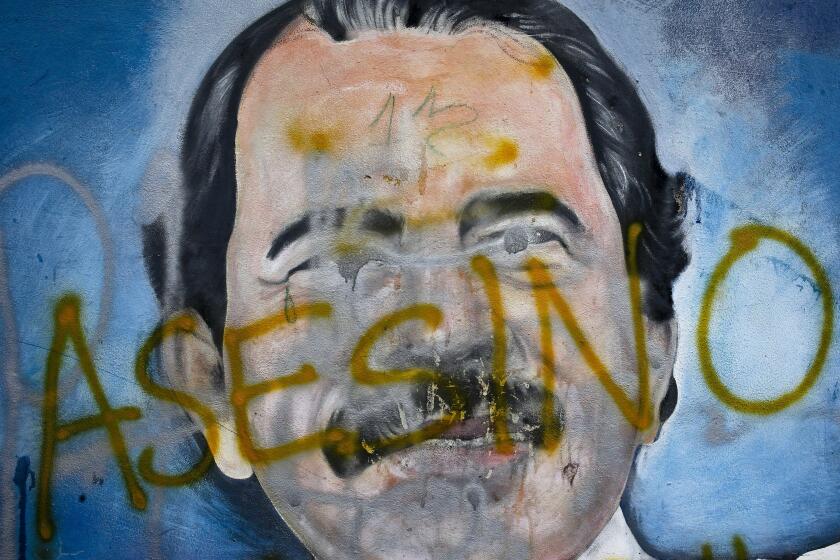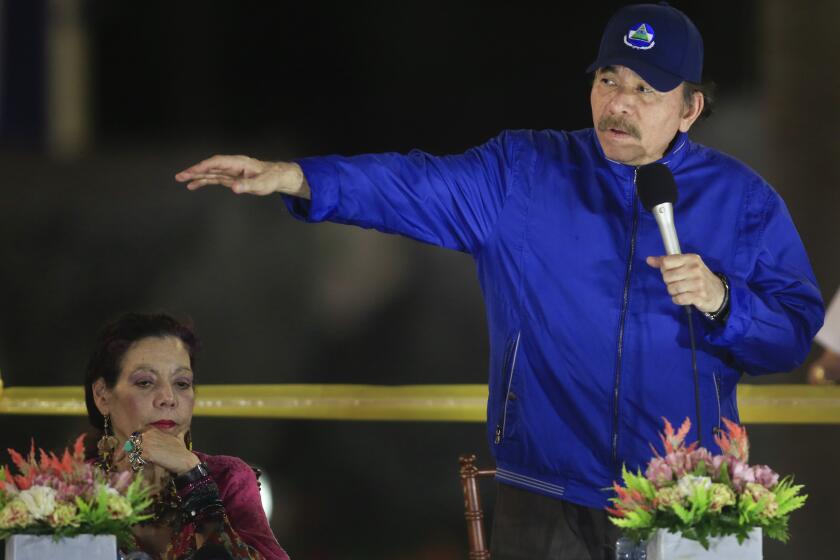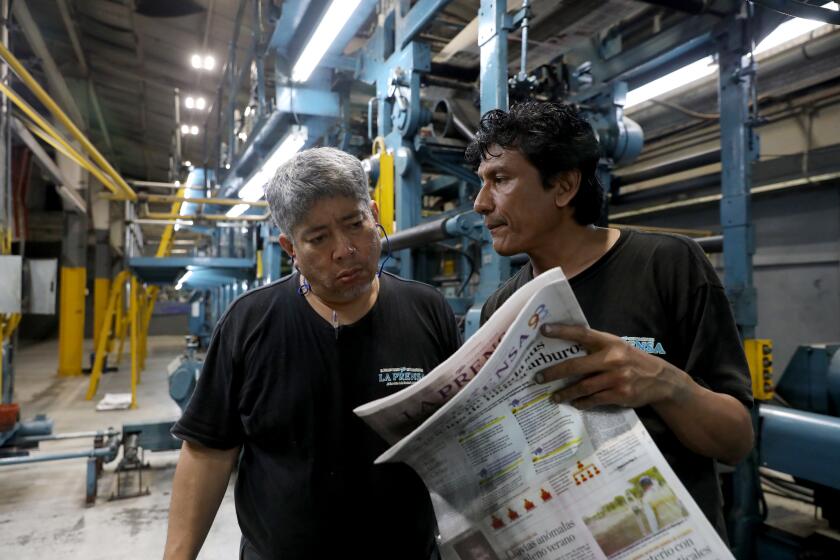International pressure mounts against Nicaragua’s crackdown on government critics
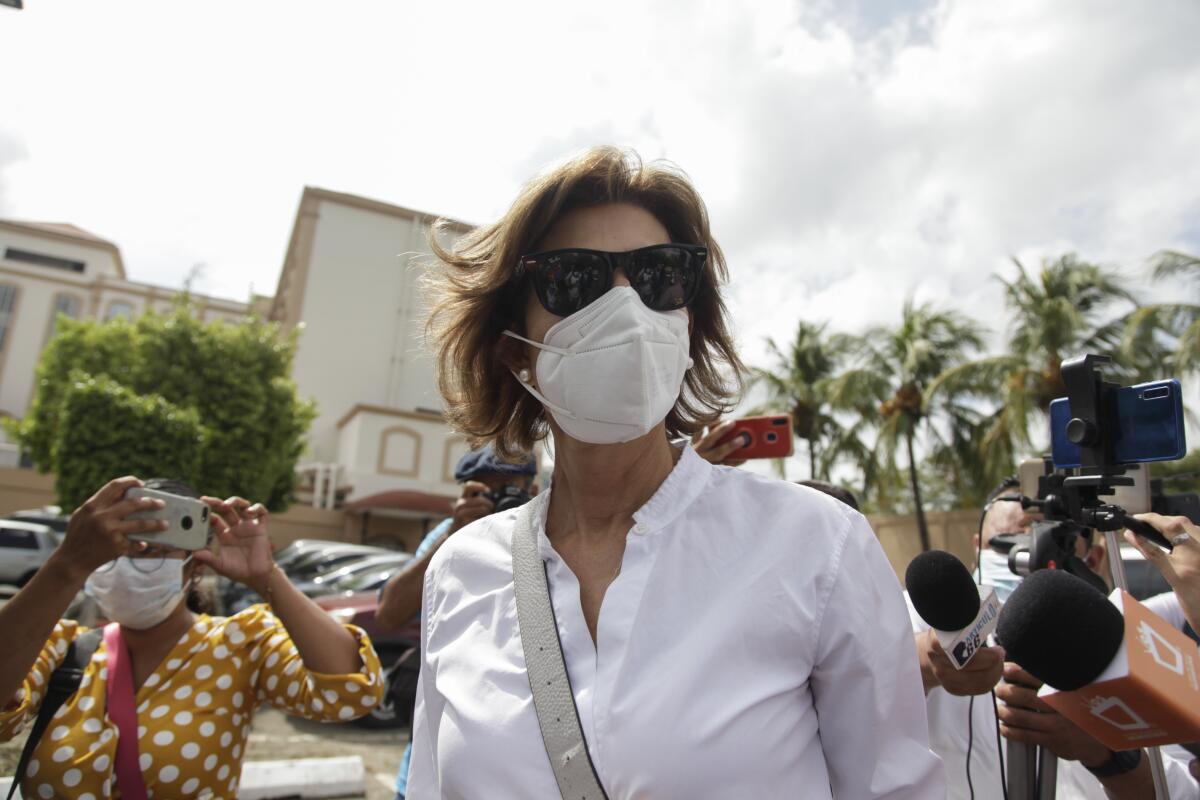
- Share via
Nicaraguan National Police officers showed up at Dora María Téllez’s door moments after the former health minister had talked of seeking international help to push for a fair presidential election in the fall.
Officers grabbed Téllez by the hair, her relatives said, punched her in the stomach, handcuffed her and loaded her into a car at her ranch on the outskirts of Managua, the nation’s capital.
Ana Margarita Vijil, a lawyer and human rights activist who’s also a staunch opponent of Nicaraguan President Daniel Ortega, accompanied Téllez when police arrived after a media interview June 13 and was taken away as well.
“This is part of the process to get out from under Daniel Ortega,” Vijil said in a video she recorded in anticipation of being taken into custody. “Around here, no one’s giving up.”
The women are among 20 people in Nicaragua — including politicians, activists, journalists and a banking executive — swept up in what government critics describe as a recent crackdown on Ortega opponents. Many observers view the detainments as human rights violations driven by the ruling government’s goal of removing obstacles to the president’s ability to capture a fourth term as ruler.
To clear the path, critics say, the Ortega government in some cases is taking advantage of a law that became effective late last year that criminalizes acts that undermine Nicaragua’s “independence, sovereignty, and self-determination.” The law allows the government to classify people as “traitors to the nation.”
The president, meanwhile, counters such accusations by saying those who’ve been detained are “criminals who’ve conspired against the safety of the country.”
But rights activists and critics insist that the government has used different ways to keep challengers from gaining an advantage.
Cristiana Chamorro, the daughter of a former president and one of Ortega’s top rivals, in early June was accused of money laundering, placed under house arrest and barred from running for office just hours after announcing her plans to compete in the general election slated for Nov. 7. Until recently, Chamorro was head of a local freedom of expression organization that received U.S. funding.
The U.S. State Department has referred to the government crackdown as a campaign of terror. Human rights activists say conditions in the country of about 6 million people are deteriorating and that the government’s behavior appeared designed to prevent dissent.
Ortega, 75, rose to power after he and other Sandinista revolutionaries, including the recently detained Dora María Téllez, toppled the U.S.-backed dictator Anastasio Somoza in 1979. His wife, Rosario Murillo, serves as vice president. Other family members hold key posts in business and law enforcement. In 2014, Ortega’s party successfully pushed for a constitutional amendment to end presidential term limits.
A United Nations report released Wednesday on four months of unrest in Nicaragua describes a comprehensive effort of repression by the government that extends from the streets to the courts.
In 2018, protests over social security cuts erupted across the country, then morphed into pro-democracy demonstrations. The nationwide conflict between Ortega’s opponents and supporters was marked by a violent government response to social protest.
According to the Inter-American Commission on Human Rights, the conflict led to the deaths of 328 people. Since then, some 108,000 Nicaraguans have fled the country and more than 90 journalists and media workers have gone into exile. Most of those compelled to leave went to neighboring Costa Rica, where at least 87,000 Nicaraguans remain in exile.
On Tuesday, Human Rights Watch issued a report on Nicaragua saying that the Ortega administration’s “intensifying campaign of violence and repression … requires escalating involvement by the United Nations.”
The recent high-profile arrests, according to the report, “appear to be part of a broader strategy to eliminate political competition, stifle dissent, and pave the way for President Daniel Ortega’s re-election.” The report also adds that “Police officers — and, at times, members of the military — frequently station themselves outside the houses of government critics, preventing them from leaving their homes.”
That same day, Michelle Bachelet, the U.N. high commissioner for human rights, called for Nicaragua’s government to take concrete steps toward ameliorating what she described as a “climate of terror.”
“We continue to document cases of arbitrary detention, aggression and harassment on the part of the National Police,” Bachelet said during the Human Rights Council session.
For the country to have a credible election, she said, its citizens’ rights and liberties must be restored. She particularly took issue with a recent change to Nicaragua’s penal code, which allows for those under investigation to be detained for up to 90 days, instead of 48 hours, a move some legal experts maintain is unconstitutional.
Nicaragua’s Congress has passed a law that would essentially ban opposition candidates from running in the 2021 presidential elections.
Denis Moncada, Nicaragua’s minister of foreign affairs, responded to Bachelet by denouncing the U.S. and its European “accomplices.”
“We’re nobody’s colony,” he said at the session, calling for the organizations “that are supposed to serve to defend human rights” to stop reproducing the “imperial and interventionist discourse.”
“Our laws are the same or similar to those of any other country,” said Moncada. Those who say otherwise, he said, are participating in a defamation strategy meant to undermine Nicaragua’s sovereignty.
The U.S. Treasury Department has slapped sanctions on the daughter of Nicaraguan President Daniel Ortega and a top army official.
Meanwhile, international condemnation of Nicaragua continues to mount. At a press conference during a trip to Costa Rica this month, Spain’s President Pedro Sánchez urged Ortega to “play fair” and free his opponents.
In response to the recent arrests and Nicaragua’s failure to implement electoral reforms demanded by the Organization of American States, the U.S. froze the assets of four members of the Ortega administration, including his daughter and a top army official. Canada, Switzerland and the European Union have imposed similar measures, along with travel bans, against personal advisors to Ortega, high-ranking representatives of Nicaragua’s judicial system and police officers accused of violating human rights.
“As those sanctions demonstrate, there are costs for those who carry out repressive acts on behalf of President Ortega and Vice President Murillo,” said U. S. Department of State spokesman Ned Price in a telephone briefing with reporters in Washington on Tuesday.
“We continue to call on President Ortega and the Nicaraguan Government to immediately release presidential contenders Cristiana Chamorro, Arturo Cruz, Félix Maradiaga, Juan Sebastián Chamorro and Miguel Mora, and other journalists, civil society, and opposition leaders arrested in the current wave of repression,” he said. “We condemn this ongoing campaign of terror in the most unequivocal terms, and consider President Ortega, Vice President Murillo, and those complicit in these actions responsible for their safety and for their well-being.”
This week, 59 countries signed on to a joint statement calling on Nicaragua “to cease harassment of journalists and human rights defenders” and allow civil society organizations to operate “without fear of reprisal.” They also reiterated calls for the immediate release of presidential contenders.
Even countries that were reluctant to interfere seem to be weighing the best course of action.
Argentina and Mexico, which did not sign onto the missive and abstained from voting in favor of an Organization of American States resolution condemning the recent arrests of opposition figures, recalled their ambassadors to Nicaragua for consultations on Monday after Ortega’s government detained yet another presidential contender.
Nicaraguan President Daniel Ortega has carried out a war on the press, jailing journalists and closing news outlets. In a blow to the storied La Prensa newspaper, he barred delivery of newsprint and ink.
Many of those who have left Nicaragua keep a close watch on such developments.
Gonzalo Carrión, 60, was a legal director at the Nicaraguan Center for Human Rights in Managua before he became an exile in Costa Rica in December 2018.
Carrión said he left Nicaragua with nothing but a backpack, not knowing when he’d return. He has not seen his wife and one of his daughters in 18 months. He believes he’ll go back.
“The time will come,” he said in a phone interview. “The Nicaraguan people figured out how to free themselves of other dictatorships, and this one won’t be the exception.”
Times staff writer Tracy Wilkinson in Washington contributed to this report.
More to Read
Sign up for Essential California
The most important California stories and recommendations in your inbox every morning.
You may occasionally receive promotional content from the Los Angeles Times.
